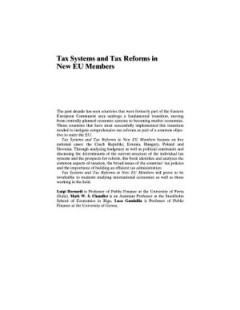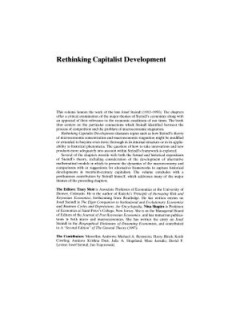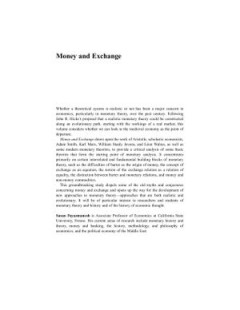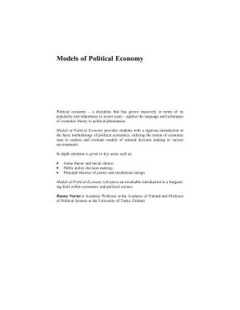Filter by

Tax Systems and Tax Reforms in New EU Member States
Building on the work carried out in the 2004 Routledge book, Tax Systems and Tax Reforms in Europe, an international team of contributors now turn their attention to the new EU member states. The book compares conditions in the new and potential EU Member states to those in the long-standing EU countries. Topics covered include: * A Comparative View of Taxation in the EU and in New Members * Ta…
- Edition
- -
- ISBN/ISSN
- 9780203023075
- Collation
- -
- Series Title
- -
- Call Number
- 650

Rethinking Capitalist Development
This collection honours the work of the eminent economist Josef Steindl. Steindl's work is illuminated through a critical appraisal of its central constructs with a focus on its relevance to current economic conditions. This collection charts the thinking of one of the leading economic theorists of the twentieth century.
- Edition
- -
- ISBN/ISSN
- 9780203645901
- Collation
- -
- Series Title
- -
- Call Number
- 650

Media Migration and Public Opinion Myths Prejudices and the Challenge of Att…
Sensitive issues like migration and human mobility provoke paradigms and prejudices in public opinion. Media, Migration and Public Opinion is a collective effort of academic criticism to over-come these myths. The main motive of this book is linked to the fact that migration, media and public opinion related issues focusing on North Africa have not been addressed properly by available literatur…
- Edition
- -
- ISBN/ISSN
- 9783034305778
- Collation
- -
- Series Title
- -
- Call Number
- -

Media, Knowledge & Education Exploring New Spaces, Relations and Dynamics in…
In recent years, new and established media have penetrated, challenged, and often surpassed in significance traditional institutions of socialization and education. Moreover, the social organization of knowledge production and distribution has become highly mediated through increasingly complex combinations of information and communication technologies. The papers in this volume are exploring i…
- Edition
- -
- ISBN/ISSN
- 9783902571670
- Collation
- -
- Series Title
- -
- Call Number
- -

Media Infrastructures and the Politics of Digital Time Essays on Hardwired T…
Digital media everyday inscribe new patterns of time, promising instant communication, synchronous collaboration, intricate time management, and profound new advantages in speed. The essays in this volume reconsider these outward interfaces of convenience by calling attention to their supporting infrastructures, the networks of digital time that exert pressures of conformity and standardization…
- Edition
- -
- ISBN/ISSN
- 9789048550753
- Collation
- -
- Series Title
- -
- Call Number
- -

Money and Exchange
Whether a theoretical system is realistic or not has been a concern in economics, particularly in monetary theory, over the past century. Following John R. Hicks’ proposal that a realistic monetary theory could be constructed along an evolutionary path, starting with the workings of a real market, this volume considers whether we can look to the medieval economy as the point of departure. Dra…
- Edition
- -
- ISBN/ISSN
- 9780203965580
- Collation
- -
- Series Title
- -
- Call Number
- 650

Media, Indigeneity and Nation in South Asia
How do videos, movies and documentaries dedicated to indigenous communities transform the media landscape of South Asia? Based on extensive original research, this book examines how in South Asia popular music videos, activist political clips, movies and documentaries about, by and for indigenous communities take on radically new significances. Media, Indigeneity and Nation in South Asia shows …
- Edition
- -
- ISBN/ISSN
- 9780429755620, 0429755627
- Collation
- -
- Series Title
- -
- Call Number
- -

Monetary Policy and Unemployment
This book pulls together papers presented at a conference in honour of the 1981 Nobel Prize Winner for Economic Science, the late James Tobin. Among the contributors are Olivier Blanchard, Edmund Phelps, Charles Goodhart and Marco Buti. One of the main aims of the conference was to discuss what potential role monetary policy has on economic activity and unemployment reduction in three key curre…
- Edition
- -
- ISBN/ISSN
- 9780203329580
- Collation
- -
- Series Title
- -
- Call Number
- 650

Models of Political Economy
Models of Political Economy will introduce students to the basic methodology of political economics. It covers all core theories as well as new developments including: decision theory game theory mechanism design games of asymmetric information. Hannu Nurmi's text will prove to be invaluable to all students who wish to understand this increasingly technical field.
- Edition
- -
- ISBN/ISSN
- 9780203358559
- Collation
- -
- Series Title
- -
- Call Number
- 650

Media, Erotics, and Transnational Asia
Drawing on methods and approaches from anthropology, media studies, film theory, and cultural studies, the contributors to Media, Erotics, and Transnational Asia examine how mediated eroticism and sexuality circulating across Asia and Asian diasporas both reflect and shape the social practices of their producers and consumers. The essays in this volume cover a wide geographic and thematic range…
- Edition
- -
- ISBN/ISSN
- 9781478091431
- Collation
- -
- Series Title
- -
- Call Number
- -
 Computer Science, Information & General Works
Computer Science, Information & General Works  Philosophy & Psychology
Philosophy & Psychology  Religion
Religion  Social Sciences
Social Sciences  Language
Language  Pure Science
Pure Science  Applied Sciences
Applied Sciences  Art & Recreation
Art & Recreation  Literature
Literature  History & Geography
History & Geography